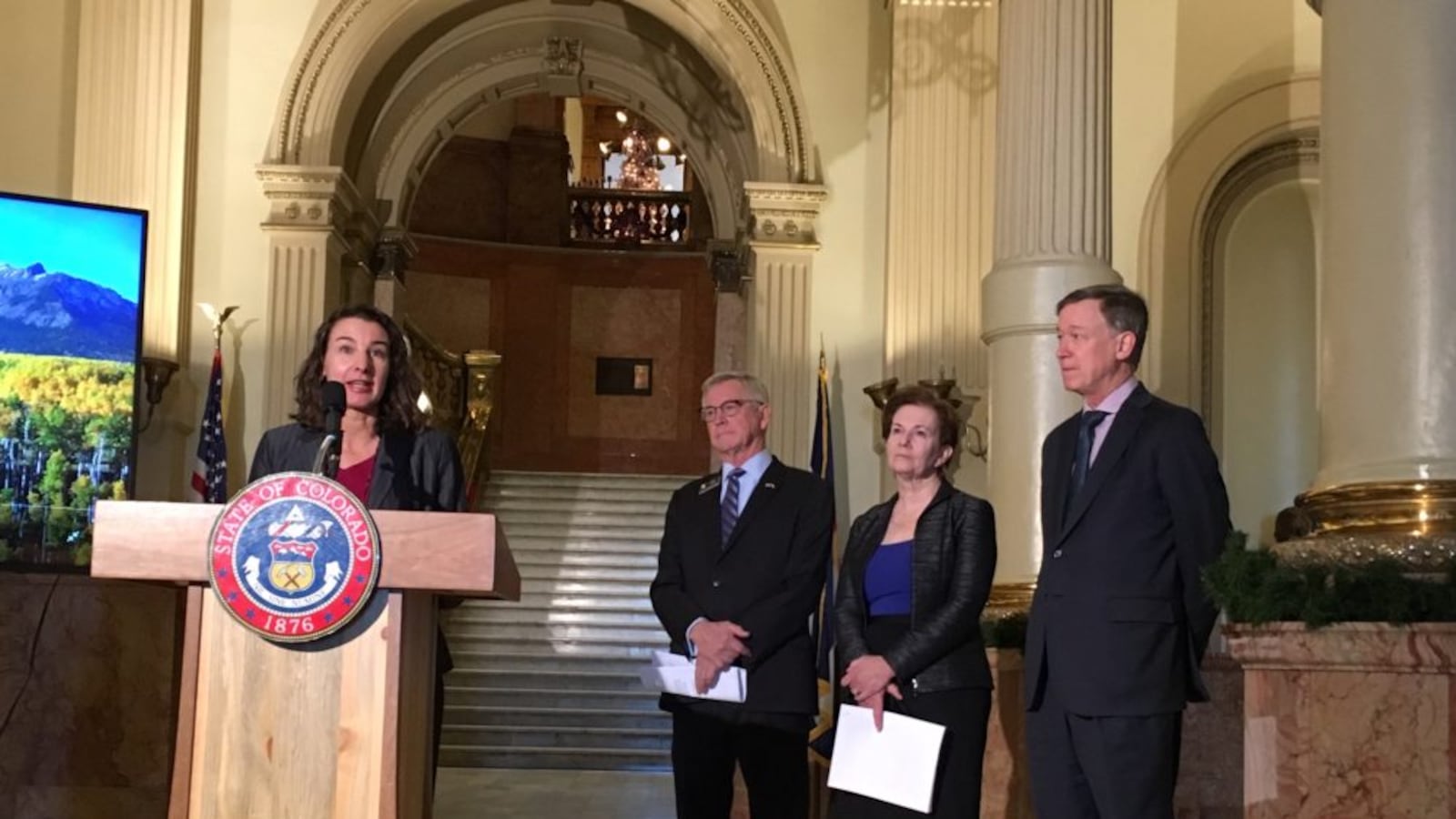With just a few weeks left in office, Gov. John Hickenlooper unveiled an educational blueprint for Colorado that he hopes his successor, governor-elect Jared Polis, will take to heart.
The proposals range from increasing teacher pay and making training opportunities more relevant to the classroom to forging partnerships between business and education. They urge policy makers to build on ideas that have already worked at the school or district level. They also suggest revamping the school finance formula, a challenging task that has eluded lawmakers so far.
The legislators who served on the Education Leadership Council that wrote “The State of Education” praised the final product and promised it wouldn’t languish on a shelf. State Sen. Nancy Todd, an Aurora Democrat and former teacher who will chair the Senate Education Committee, said she was committed to “put some legs on it.”
State Rep. Bob Rankin, a Republican from Carbondale who served as co-chair of the Education Leadership Council with Colorado Education Commissioner Katy Anthes, said that a common refrain during his years in the legislature has been that the state lacks a broad vision for education. That’s made it difficult to move forward on thorny questions.
“The State of Education” provides that vision, Rankin said, and can serve as an “anchor” for lawmakers drafting bills and district leaders looking for new ideas. It’s also a way to show the public how Colorado could be a national leader in education, starting in preschool and continuing all the way through retraining for workers changing careers, he said.
Anthes stressed that the report is not a new set of mandates for school districts and that the plan respects Colorado’s principle of local control.
“We recognize that local context matters,” the report summary reads. ”While the subcommittees came to consensus on the principle and strategies for their components of this plan, we know that not every improvement strategy is right for every community.”
Even as the plan lays out ways to prepare students for the jobs of tomorrow, it also highlights the state’s acute need for many of those students to choose careers in education. Lt. Gov. Donna Lynne, who was heavily involved in the project, noted that the “talent pipeline” for early childhood teachers in particular needs to be larger and that pay and opportunities for advancement will have to increase if more workers are to enter and stay in the profession.
The report calls for higher base compensation for teachers, for financial incentives like loan forgiveness and paid student teaching, and for evaluating and improving the working conditions in “hard-to-staff” schools.
It also calls for maintaining a high bar through teacher licensing and for alternative certification programs — used by many to enter teaching as a second career or after majoring in something other than education — to have equivalent standards.
At the same time, the report said the state should monitor licensure policies that may disproportionately discourage teachers of color as Colorado seeks to have a teacher workforce that looks more like the students it serves.
In contrast to earlier pushes for school improvement that focused on test-based accountability for schools and teachers, this report frequently mentions flexibility, collaboration, support, respect, and empowering educators.
The report calls for schools to provide a greater diversity of learning experiences for students, to be more flexible in where learning occurs, and to pay more attention to the challenges students face outside the classroom. It calls for deeper exploration of the community schools model, which involves greater collaboration between parents and teachers and a wide range of services not just for students but also for parents and younger siblings.
“The State of Education” was developed by the Educational Leadership Council, a bipartisan group of lawmakers, educators, business and community leaders, and heads of state agencies convened by Hickenlooper in 2017. Members used input from more than 6,000 people who took an online survey about their education priorities, some 500 people who attended more than 70 roundtable discussions, and 100 people who served on four subcommittees.
Lawmakers will be weighing these ideas without a major new revenue source after the failure of the Amendment 73 school tax increase. Polis campaigned on a platform that included funding full-day kindergarten and significantly expanding access to preschool, while some lawmakers have suggested special education needs more attention.
Rankin said the state budget has money for targeted programs — Hickenlooper’s proposed 2019-20 budget already includes $10 million to fund ideas developed by the Education Leadership Council — but he also stressed that districts and local communities don’t need to wait for the state to pursue the ideas in the report.
“There is significant money going into education even after the failure of Amendment 73,” said Rankin, who also serves on the Joint Budget Committee. “There’s always room for new initiatives, whether they happen out in rural Colorado or in Denver Public Schools. I think it’s going to be up the districts themselves within their budgets to take up some of these priorities.”
Members of the incoming Polis administration have been briefed on the plan, and Hickenlooper said he hopes the plan will prove useful. A spokesperson for Polis declined to comment on the report.
Hickenlooper said providing all students with a good education is essential to maintaining Colorado’s strong economy.
“We will not stay No. 1 if we do not invest in our kids,” he said.
Read the full report here.

